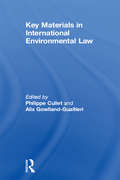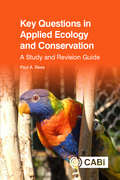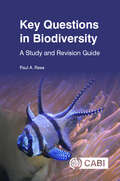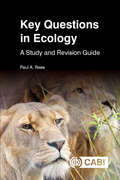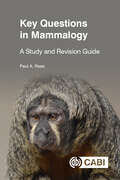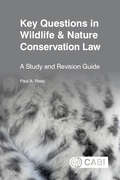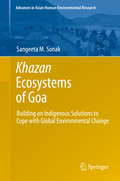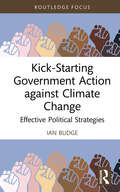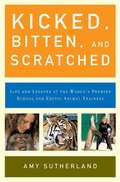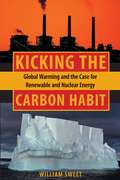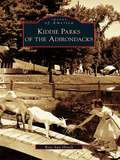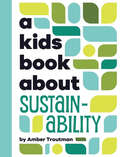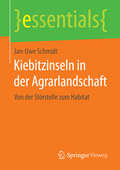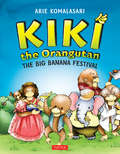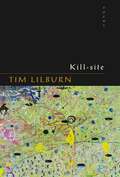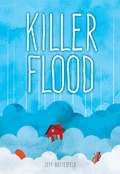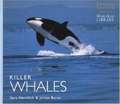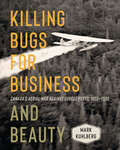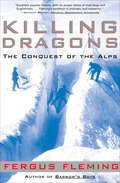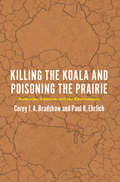- Table View
- List View
Key Materials in International Environmental Law
by Alix Gowlland-GualtieriThis compilation of key materials in international environmental law takes account of the most significant developments in the field that have occurred during the past decade, including in the areas of climate change, chemicals and pesticides, biosafety, and nuclear safety, as well as good governance, compliance and liability. Not only does multilateral environmental law making have wide-ranging repercussions on the way national development policies are drafted and business is conducted, but also environmental issues increasingly interweave with those relating to human rights, trade, agriculture and intellectual property, making familiarity with the key instruments in international law essential for all working in these areas. The book comprises a representative selection of the most important studies in international environmental law, with an editorial introduction to each topic. Its focus on recent trends and cross-sectoral aspects makes it an indispensable tool for students, researchers, practitioners and policy makers in international environmental law and related fields.
Key Questions in Applied Ecology and Conservation: A Study and Revision Guide (Key Questions)
by Dr Paul ReesAn understanding of applied ecology and conservation is an important requirement of a wide range of programmes of study including applied biology, ecology, environmental science and wildlife conservation. This book is a study and revision guide for students following such programmes. It contains 600 multiple-choice questions (and answers) set at three levels - foundation, intermediate and advanced - and grouped into 10 major topic areas: History and foundations of applied ecology and conservation Environmental pollution and perturbations Wildlife and conservation biology Restoration biology and habitat management Agriculture, forestry and fisheries management Pest, weed and disease management Urban ecology and waste management Global environmental change Environmental and wildlife law and policy Environmental assessment, monitoring and modelling The book has been produced in a convenient format so that it can be used at any time in any place. It allows the reader to learn and revise the meaning of terms used in applied ecology and conservation, study the effects of pollution on ecosystems, the management, conservation and restoration of wildlife populations and habitats, urban ecology, global environmental change, environment law and much more. The structure of the book allows the study of one topic area at a time, progressing through simple questions to those that are more demanding. Many of the questions require students to use their knowledge to interpret information provided in the form of graphs, data or photographs.
Key Questions in Biodiversity: A Study and Revision Guide (Key Questions)
by Dr Paul ReesAn understanding of biodiversity is an important requirement of a wide range of programmes of study including biology, zoology, wildlife conservation and environmental science. This book is a study and revision guide for students following such programmes in which biodiversity is an important component. It contains 600 multiple-choice questions (and answers) set at three levels - foundation, intermediate and advanced - and grouped into 10 major topic areas: 1. Principles of classification and taxonomy 2. Comparative anatomy and physiology 3. Protoctists, monerans, fungi, lichens and acellular organisms 4. 'Lower' plants and pteridophytes 5. Seed-bearing plants 6. Sponges, cnidarians, nematodes and minor animal phyla 7. Platyhelminths, annelids and molluscs 8. Arthropods and echinoderms 9. Fishes, amphibians and reptiles 10. Birds and mammals The book has been produced in a convenient format so that it can be used at any time in any place. It allows the reader to learn and revise the meaning of terms used in animal and plant classification, the principles of comparative physiology, and the characteristics of, and diversity in, the major animal and plant taxa. The structure of the book allows the study of one topic area or group of taxa at a time, progressing through simple questions to those that are more demanding. Many of the questions require students to use their knowledge to identify organisms and biological structures from drawings or photographs.
Key Questions in Ecology: A Study and Revision Guide (Key Questions)
by Dr Paul ReesAn understanding of ecology is an important requirement of a wide range of academic areas, including biology, zoology and environmental science. This book is a study and revision guide for students following programmes of study in which ecology is an important component. It contains 600 multiple-choice questions (and answers) set at three levels - foundation, intermediate and advanced - and grouped into 10 major topic areas: · The history and foundations of ecology · Abiotic factors and environmental monitoring · Taxonomy and biodiversity · Energy flow and production ecology · Nutrient and material cycles · Ecophysiology · Population ecology · Community ecology and species interactions · Ecological genetics and evolution · Ecological methods and statistics The book has been produced in a convenient format so that it can be used at any time in any place. It allows the reader to learn and revise the meaning of ecological terms, the basic processes operating in ecosystems, the dynamics of populations, ecological genetics and the process of evolution, the methods used in ecological surveys, and much more. The structure of the book allows the study of one topic area at a time, progressing through simple questions to those that are more demanding. Many of the questions require students to use their knowledge to interpret information provided in the form of graphs, data or photographs, providing a useful tool for independent study.
Key Questions in Mammalogy: A Study and Revision Guide (Key Questions)
by Dr Paul ReesAlthough mammals comprise a relatively small proportion of total biodiversity they are disproportionately represented in courses in biology and zoology and they are the dominant taxon in zoos around the world. Mammalogy is well-established as a discrete element of biological courses in some parts of the world, notably in North America. This book is intended as a study and revision guide for students following programmes of study in which mammalogy is an important component. It comprises 600 multiple-choice questions (and answers) set at three levels - foundation, intermediate and advanced - grouped into 10 major topic areas: 1. The history and principles of mammalogy 2. Origins, evolution and taxonomy 3. Anatomy 4. Physiology 5. Behaviour 6 Ecology and genetics 7. Zoogeography 8. Conservation and management 9. Parasites and diseases 10. Domestication and human use of animals The book is designed to be used at any time in any place. It allows the reader to study the meaning of terms used in mammalogy, the history of mammalogy, the taxonomy, evolution and genetics of mammals, their zoogeography, their anatomy, physiology and adaptations to their environment, their behaviour, their conservation and management, their diseases, and their domestication and use by humans. Some of the questions will require students to use their knowledge to interpret information provided in the form of graphs, data, maps or photographs
Key Questions in Wildlife & Nature Conservation Law: A study and revision guide (Key Questions)
by Dr Paul ReesLaw plays an essential part in the conservation of wildlife and ecosystems. The study of wildlife and nature conservation law is an important component of a wide range of programmes of study including wildlife conservation, environmental management and environmental law. This book is a study and revision guide for students following such programmes. It contains 600 multiple choice questions (and answers) set at three levels - foundation, intermediate and advanced - and grouped into 10 major topic areas: 1. Principles of Wildlife and Nature Conservation Law 2. History of Wildlife and Nature Conservation Law 3. Species Protection and Exploitation I - EU and International Law 4. Species Protection and Exploitation II - National Laws 5. Protected Areas and Habitats I - EU and International Laws 6. Protected Areas and Habitats II - National Laws 7. Planning, Pollution, Restoration and Conservation Funding 8. Wildlife Trade, Animal Collections and Alien Species 9. Wildlife Law Enforcement and Penalties 10. Legal Texts This book has been produced in a convenient format so that it can be used at any time, in any place. It allows the reader to learn and revise the meaning of terms used in wildlife and nature conservation law and study the role of legislation at national, European Union (EU) and international level in the protection of individual species, habitats and landscapes. It uses examples from a wide variety of taxa, habitats and protected areas selected from a range of jurisdictions from the United Kingdom, the United States and Australia to Antarctica and the High Seas. Topics include the control of hunting, the conservation of trees and forests, the protection of National Parks and wilderness areas, wildlife trade and the organisations involved in the enforcement of wildlife laws. The structure of the book allows the study of one topic area at a time, progressing through simple questions to those that are more demanding. Some of the questions require students to use their knowledge to interpret information provided in the form of photographs and legal texts.
Khazan Ecosystems of Goa
by Sangeeta M. SonakThis book elaborates on the Khazan ecosystems of Goa, India. Khazans are human-managed ecosystems, which are reclaimed from coastal wetlands, salt marshes and mangrove areas, where tidal influence is regulated through a highly structured system of dykes, canals, furrows, and sluice gates using resources that are amply available locally. Khazan ecosystems are marvels of tribal engineering. They are a simple architectural design, which operate at a very low running cost using tidal, hydro, and solar energy. The design contributes to a highly complex but eco-friendly ecosystem integrating agriculture, aquaculture and salt panning. . Khazan ecosystems have been functional for the last 3500 years. The history of Khazans is very ancient and can be traced to the transition from food gathering to food growing, which has been regarded as the biggest step in the history of human civilization. Khazan ecosystems thus have a high historical and world heritage value. They are also repositories of global biodiversity, with unique flora suitable to their unique and highly variable environment. They are endemic and heritage ecosystems of Goa and ultimately reservoirs of history and heritage. Using the example of the Khazan lands, the book analyzes and comments on traditional ecological knowledge and indigenous technology. It presents the evolution of Khazan management institutions over a period of more than three thousand years, as well as factors that have contributed to its decline in recent years It develops a conceptual framework for ecosystem performance and suggests strategies for conservation of Khazans as well as strategies to build on these indigenous adaptation mechanisms to cope with the global environmental change.
Kick Start (Orca Sports)
by Michele Martin BossleyWhen Mitch Harding makes an impulse buy, he really goes big. He spends his entire savings on a wrecked dirt bike after witnessing a rider crash it at an Endurocross race. He is now the proud owner of a used bike, one that needs a lot of work. With the help of his uncle, an ex-pro rider, and new friend Kelsey, a championship rider herself, they get the bike up and running. But a bet with the previous owner threatens to strip Mitch of his hard-earned vehicle. Whoever wins the next race gets to keep the bike. Mitch is determined to win. But partway through the race he discovers Kelsey lying on the trail, her bike on its side. With serious injuries and no way to get help, Kelsey has no choice but to ride out. But as Mitch and Kelsey push to get off the mountain, the path to safety gets more complicated.
Kick-Starting Government Action against Climate Change: Effective Political Strategies (Routledge Advances in Climate Change Research)
by Ian BudgeWith drastic action needing to be taken now, rather than over the 30 years to 2050, this book addresses the crucial question of how to get action from governments who will always put short-term considerations (e.g. post Covid economic growth) over longer term climate priorities – unless forced to do otherwise. How might governments be persuaded to implement policies that will result in effective action? And how can this be achieved at an international, as well as national, level? These are the questions that this book focuses on. Taking a systematic political science point of view and drawing on collective choice and other theories of political action, this book analyses the key political and economic dynamics shaping climate policies around the world, identifying major political opportunities that can be exploited by well-informed and determined political actors, such as NGOs and social movements. This book describes how to advance and accelerate climate action around the world and will be of interest internationally to climate change campaigners, activists, political and environmental scientists.
Kicked, Bittten, and Scratched: Life and Lessons at the World's Premier School for Exotic Animal Trainers
by Amy SutherlandWalking cougars on leashes, teaching a mandrill to get an injection, working with elephants, and teaching rats to run up mazes are some of the things students in the Exotic Animal Training and Management program do at Moore Park College. Follow the "first year" students as they learn and grow to develop confidence in handling animals and improve their ways of managing each other. Good read for anyone interested in any type of animal training.
Kicking the Carbon Habit: Global Warming and the Case for Renewable and Nuclear Energy
by William SweetWith glaciers melting, oceans growing more acidic, species dying out, and catastrophic events like Hurricane Katrina ever more probable, strong steps must be taken now to slow global warming. Further warming threatens entire regional economies and the well being of whole populations, and in this century alone, it could create a global cataclysm. Synthesizing information from leading scientists and the most up-to-date research, science journalist William Sweet examines what the United States can do to help prevent climate devastation.Rather than focusing on cutting oil consumption, which Sweet argues is expensive and unrealistic, the United States should concentrate on drastically reducing its use of coal. Coal-fired plants, which currently produce more than half of the electricity in the United States, account for two fifths of the country's greenhouse gas emissions of carbon dioxide into the atmosphere. Sweet believes a mixture of more environmentally sound technologies-wind turbines, natural gas, and nuclear reactors-can effectively replace coal plants, especially since dramatic improvements in technology have made nuclear power cleaner, safer, and more efficient.Sweet cuts through all the confusion and controversies. He explores dramatic advances made by climate scientists over the past twenty years and addresses the various political and economic issues associated with global warming, including the practicality of reducing emissions from automobiles, the efficacy of taxing energy consumption, and the responsibility of the United States to its citizens and the international community to reduce greenhouse gases. Timely and provocative, Kicking the Carbon Habit is essential reading for anyone interested in environmental science, economics, and the future of the planet.
Kiddie Parks of the Adirondacks
by Rose Ann HirschThe first kiddie parks in North America were born in the lush forests of the Adirondack Mountains in the 1950s. These parks brought to life the characters of beloved fairytales,legends, and nursery rhymes through live performers, animated figures, and themed mechanical rides. Kiddie Parks of the Adirondacks contains images of some of the Adirondacks' most popular kiddie parks: Storytown U.S.A., Enchanted Forest of the Adirondacks, the Land of Make Believe, Magic Forest, and Santa's Workshop. Each park is home to various fantasy-themed amusements built to accommodate children rather than adults. Four of the five parks are still in operation and continue to entertain new generations of children every year.
Kids Book About Sustainability, A (A Kids Book)
by Amber TroutmanWe can all choose sustainable practices today to improve the health of our planet for ourselves and future generations!Sustainability is a long word that simply means to live on this Earth in a responsible way. We do this for ourselves, for all fellow inhabitants, current and future, and for the planet itself. Open this book and learn the good and not-so-good impact our actions have on the Earth. And, importantly, how we can start living sustainably today. Lasting change takes time, and our choices really matter!
Kids Camp!: Activities for the Backyard or Wilderness
by Laurie Carlson Judith DammelActivities to help young campers build an awareness of the environment, learn about insect and animal behavior, boost their self-esteem, and learn the basics for fun, successful camping.
Kids Can Help the Environment (Kids Can Help)
by Emily RaijMake the world a cleaner, healthier place to live! This book is full of ideas and projects readers can put into action to help the environment.
Kiebitzinseln in der Agrarlandschaft: Von der Störstelle zum Habitat (essentials)
by Jan-Uwe SchmidtIn diesem essential beschreibt Jan-Uwe Schmidt, wie durch Kiebitzinseln nicht nur dem Kiebitz geholfen wird, sondern auch andere Tier- und Pflanzenarten profitieren k#65533;nnen. Durch j#65533;hrliche Anlage einer Schwarzbrache mit mindestens 2 Hektar Gr#65533;#65533;e lassen sich Nassstellen leicht als Kiebitzbrutplatz einrichten. Landwirte erh#65533;hen so die Nachhaltigkeit der Landnutzung und schaffen au#65533;erdem einen sicheren Erl#65533;s aus der Verg#65533;tung der Agrarumweltma#65533;nahme. Dieses essential gibt praktische Hinweise zur Planung und Anlage von Kiebitzinseln mithilfe von Luftbildern.
Kiki the Orangutan
by Arie KomalasariKiki is bored. And hungry! His family is busy, he wants to play, but no one has the time. So Kiki goes for a walk...and that's where all the trouble begins!Kiki the Orangutan is the charming tale of a naughty but good-natured orangutan who simply cannot resist stealing a bunch of ripe bananas from his neighbor's tree. After he has eaten them, however, he finds out that the bananas were going to be used to make banana bread-his favorite food-for the Banana Festival the next day. Now his poor neighbor has no bananas left to make any bread! Can Kiki make up for his actions and find a new bunch of bananas in time?
Kill the Cowboy: A Battle of Mythology in the New West
by Sharman Apt RussellOn ranching, environmentalism, and change -- life and thought in the West, seen through the eyes of some of the players.
Kill-site
by Tim LilburnBy the winner of the Saskatchewan Book Award for Best Book of the YearTo his virtuoso collection of new poems, Tim Lilburn brings a philosopher’s mind and the eyes and ears of a marsh hawk. This series of earthy meditations makes the strange familiar and the familiar strange. Lilburn’s close study of goldenrod, an ice sheet, or night opens into surprising interior and subterranean worlds. Pythagoras lurks within the poplars, Socrates in stones, people fly below the ground. Elsewhere, the human presence of motels and beer parlours is ominous. Kill-site is an exploration of a human’s animal nature. Lilburn invites the reader to: “Go below the small things… then / walk inside them and you have their kindness.” Though a natural progression from Lilburn’s last book, To the River, in Kill-site, the poet moves toward a greater understanding of the human, of sacrifice.
Killer Flood (Red Rhino)
by Jeff GottesfeldDan and Pete are excited to have a sleepover at Dan’s house while their parents are away. Their excitement turns to fear when the dam breaks and a killer flood smashes through town. The boys decide to stay put until they realize that Dan’s elderly neighbors may be in danger. When they reach the neighbors’ house, they find one of them near death. His lifesaving medicine is under water, and his wife is too old to make her way to town to get more. Both boys brave the flood to go find help. Hi-Lo Chapter Books for Children. This series of short novels was designed to engage a broad spectrum of struggling readers. No longer will upper-elementary students have to read material junior to their maturity and interests. Characters are age appropriate and come from diverse cultures and backgrounds. Science fiction, sports, paranormal, realistic life, historical fiction, and fantasy are just a few of the many genres. Books are no higher than a 1.5 reading level, with illustrations on every spread that support visual literacy and draw kids into the text.
Killer Knots
by Nancy J. CohenNancy J. Cohens Bad Hair Day mysteries are a cut above the rest--rich, full, and stylish. Now her beautician-sleuth Marla Shore puts down her curling iron and picks up her skills at detection when she books passage on a cruise ship with a killer aboard. . . Scissor-wielding sleuth Marla Shore is looking forward to a leisurely cruise with her fiancé Dalton Vail. Too bad Daltons teenage daughter and his parents are along for the ride. Instead of a seduction at sea, Marla is meeting the in-laws and hoping nothing goes too terribly wrong. Its a vain hope. A mysterious envelope stuck into her cabin door reads: I know what you did and I have what you want. If it hadnt been addressed to "Martha" Shore and obviously delivered by mistake, Marla might have feared it referred to the nudie pictures buried in her past. But that embarrassment would have been better than what the note does foretell: troubled waters lie dead ahead. So instead of cruise control, Marlas on high-alert, searching for the notes recipient before the cruise goes down the drain. If Marla doesnt find the culprit fast, this spunky stylist may end up with her own split end: caught between the devil and the deep blue sea. Praise for Nancy J. Cohens Bad Hair Day Mystery Series. . . "Plenty of humor, snappy repartee, and even a healthy helping of current events. " --Fort Myers News-Press "An amateur sleuth who can handle a curling iron and murder clues with aplomb. . . a stylish series. " --Fort Lauderdale Sun-Sentinel"Delightful. . . think The Love Boat meets Sex and the City. . . pick this one up posthaste!" --MaryJanice Davidson, New York Times bestselling author
Killer Whales (Worldlife Library)
by Sara Heimlich James BoranKiller whales are the supreme predators in the ocean. Today we are learning to respect them as intelligent and adaptable animals, rather than fear them as the loathsome creatures once imagined in legends. This revised and updated introduction to killer whales, or orcas, pieces together the latest information on how they live. We learn how they communicate and maintain well-established societies, with intricate family relationships, over long lifespans. We also learn about the environmental concerns that threaten killer whales. Illustrated by the world's best wildlife photographers, this book brings us face to face with these intriguing creatures. This is the revised edition.
Killing Bugs for Business and Beauty: Canada’s Aerial War against Forest Pests, 1913–1930
by Mark KuhlbergKilling Bugs for Business and Beauty examines the beginning of Canada’s aerial war against forest insects and how a tiny handful of officials came to lead the world with a made-in-Canada solution to the problem. Shedding light on a largely forgotten chapter in Canadian environmental history, Mark Kuhlberg explores the theme of nature and its agency. The book highlights the shared impulses that often drove both the harvesters and the preservers of trees, and the acute dangers inherent in allowing emotional appeals instead of logic to drive environmental policy-making. It addresses both inter-governmental and intra-governmental relations, as well as pressure politics and lobbying. Including fascinating tales from Cape Breton Island, Muskoka, and Stanley Park, Killing Bugs for Business and Beauty clearly demonstrates how class, region, and commercial interest intersected to determine the location and timing of aerial bombings. At the core of this book about killing bugs is a story, infused with innovation and heroism, of the various conflicts that complicate how we worship wilderness.
Killing Dragons: The Conquest of the Alps
by Fergus FlemingIn a riveting narrative of daredevils and eccentrics, Fergus Fleming gives us the breathtaking story of some of history's greatest explorers as they conquer the soaring peaks of the Alps. Fleming recounts the incredible exploits of the men whose centuries-old fear of the mountain range turned quickly to curiosity, then to obsession, as they explored Europe's frozen wilderness. In the late eighteenth century French and Swiss scientists became interested in the Alps as a research destination, but in the 1850s the focus changed: the icy mountains now offered an all-out competition for British climbers who wanted to conquer ever higher and more impossible heights, and explorers fought each other on the peaks and in the press, entertaining a vast public smitten with their bravery, delighted by their personal animosities, and horrified by the disasters that befell them. "...excellent popular history, with its proper share of mad dogs and Englishmen....Fleming's rendition is dramatic and masterful." — Anthony Brandt, National Geographic Adventure
Killing the Koala and Poisoning the Prairie: Australia, America, and the Environment
by Paul R. Ehrlich Corey J. A. BradshawThough separated by thousands of miles, the United States and Australia have much in common. Geographically both countries are expansive--the United States is the fourth largest in land mass and Australia the sixth--and both possess a vast amount of natural biodiversity. At the same time, both nations are on a crash course toward environmental destruction. Highly developed super consumers with enormous energy footprints and high rates of greenhouse-gas emissions, they are two of the biggest drivers of climate change per capita. As renowned ecologists Corey J. A. Bradshaw and Paul R. Ehrlich make clear in Killing the Koala and Poisoning the Prairie, both of these countries must confront the urgent question of how to stem this devastation and turn back from the brink. In this book, Bradshaw and Ehrlich provide a spirited exploration of the ways in which the United States and Australia can learn from their shared problems and combine their most successful solutions in order to find and develop new resources, lower energy consumption and waste, and grapple with the dynamic effects of climate change. Peppering the book with humor, irreverence, and extensive scientific knowledge, the authors examine how residents of both countries have irrevocably altered their natural environments, detailing the most pressing ecological issues of our time, including the continuing resource depletion caused by overpopulation. They then turn their discussion to the politics behind the failures of environmental policies in both nations and offer a blueprint for what must be dramatically changed to prevent worsening the environmental crisis. Although focused on two nations, Killing the Koala and Poisoning the Prairie clearly has global implications--the problems facing the United States and Australia are not theirs alone, and the solutions to come will benefit by being crafted in coalition. This book provides a vital opportunity to learn from both countries' leading environmental thinkers and to heed their call for a way forward together.
